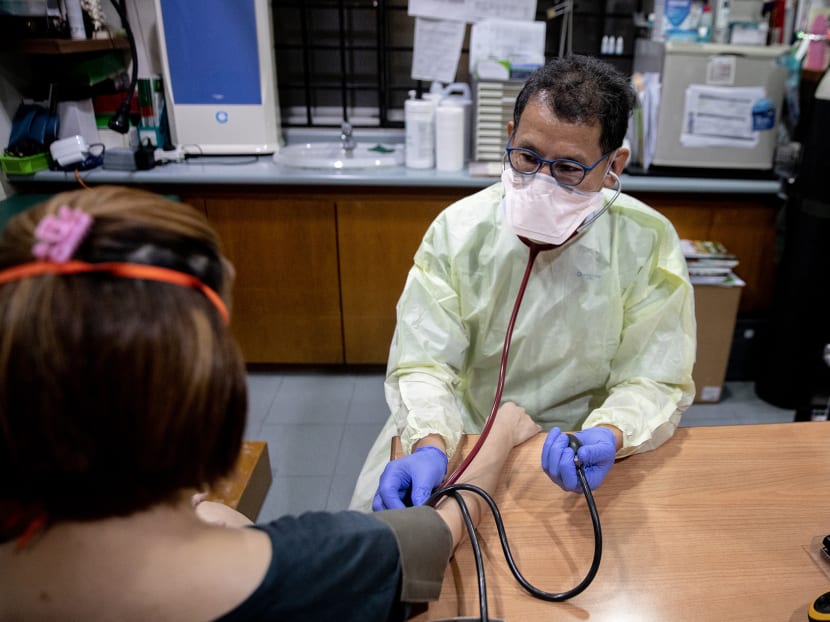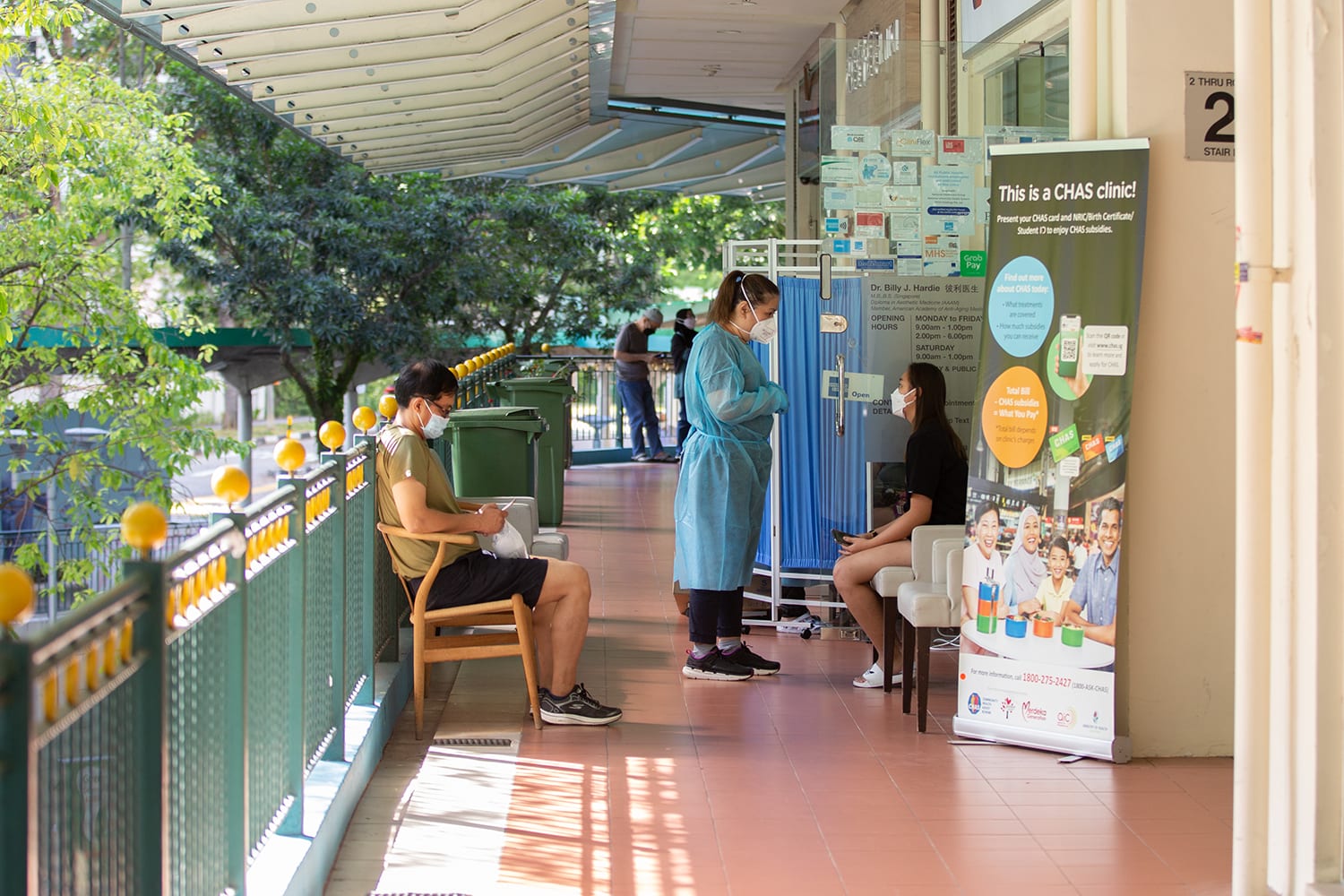GPs back nationwide move by MOH to reduce clinic-hopping but say insurance schemes are an obstacle
SINGAPORE — With more households to have their own family doctor from 2023 under a national enrolment programme by the Ministry of Health (MOH), general practitioners (GPs) told TODAY that this will help them better serve patients and that it is a good move.

Dr Tan Tze Lee (pictured), a general practitioner at a clinic in Chua Chu Kang, said that about 20 to 30 years ago, most people would have a family doctor they regularly visited for consultation.
- MOH is going to get Singapore residents to register with one family doctor of their choice from 2023 for their primary healthcare needs
- General practitioners supported the move but pointed out some areas MOH may have to review
- One major one is the matter of workplace medical insurance that covers medical fees
- By and large, doctors said patients going to one doctor used to be the practice in the past
- This method allows doctors to give them holistic care instead of when patients clinic- or doctor-hop
SINGAPORE — With more households to have their own family doctor from 2023 under a national enrolment programme by the Ministry of Health (MOH), general practitioners (GPs) told TODAY that this will help them better serve patients and that it is a good move.
However, they also said that several matters, such as the transferability of health insurance schemes, need to be ironed out in order for the programme to attract more patients.
They added that there could also be some short-term incentives, such as subsidised consultations, that could get more patients on board.
The doctors were responding to an announcement by MOH on Wednesday, that the national enrolment programme will probably start with residents in their 40s and above, which is when symptoms for chronic illnesses may start to show.
"International and local studies have shown that those who have a regular family physician are generally healthier, and have fewer hospitalisation and emergency department visits,” the ministry said.
Right now, just three in five Singaporeans have a regular doctor, MOH said. For the upcoming programme, residents will register with one primary doctor at a polyclinic or GP clinic and the doctor will be the first point of contact for any healthcare needs.
Dr Tan Tze Lee, a GP at Edinburgh Clinic in Chua Chu Kang, said that about 20 to 30 years ago, most people would have a family doctor they regularly visited for consultation.
"Now you start having insurance (packages) and company benefits, and then they say you have to go (to a specific clinic)," Dr Tan added. "In the old days, it wasn't like that."
He also said that due to the prevalence of workplace medical insurance, when patients change jobs, they may be under a different workplace medical insurer, and they will then switch clinics in order to continue getting the medical fee benefits or subsidies.
This insurance factor will pose a challenge to MOH’s new programme, which is meant to keep patients returning to the same doctor.
"This will be something that the authorities can work on with the various insurance providers... So that the healthcare support that you have is truly portable," Dr Tan suggested.
HOW THE PROGRAMME WILL HELP PATIENTS
GPs interviewed by TODAY agreed that the programme will improve the lives of patients by ensuring that they receive better healthcare by going back to a regular doctor, as well as ensuring that the consultation process is more efficient.
“When you develop a relationship with the patient, not only will you see the patient for the condition, but you're able to manage him in a more holistic manner.Dr Philip Koh from Healthway Medical Clinic”
Dr Philip Koh, a GP from Healthway Medical Clinic in Tampines, said that it is important for every doctor to form a professional relationship with their patient.
"When you develop a relationship with the patient, not only will you see the patient for the condition, but you're able to manage him in a more holistic manner," he said.
He gave the example of a patient who has hypertension or diabetes, and is looking to quit smoking.
"It takes time for one to discuss smoking cessation," he said. "If you have good relationship with the patient, you can understand why he’s smoking and if he is ready to stop.
"A lot of these things that they share with you, they only share with you after a while when they think you're someone they can confide in."
Dr Koh added that having a regular doctor also means that patients do not have to keep repeating details of their medical history and conditions whenever they see a new doctor.
"One look at them and I will know their problems, what medicine they are taking... straight away I will know what to do next for (the patient)."
Agreeing, Dr Adidah Hassan from Adidah Family Clinic and Surgery in Tampines said that having a regular doctor means that patients are able to have "continuity of care".
"The doctor is very familiar with a patient’s case history and will be able to deliver holistic care to the person," she said. "They can call us up for any queries about their medical conditions and get reminders from us to come for their next check-up."
“It's not about doing more work, it's about enabling individuals to choose the doctors so that they have the confidence to go to the same doctor and same clinic. It is the duty of every physician to take care of their patients.Dr Tan Tze Lee from Edinburgh Clinic”
The doctors all said that the added work of taking care of regular patients is not an issue to them.
Dr Tan said: "It's not about doing more work, it's about enabling individuals to choose the doctors so that they have the confidence to go to the same doctor and same clinic.
"It is the duty of every physician to take care of their patients."
Agreeing, Dr Koh said that he envisions a higher workload in the coming years anyway, with more getting chronic illnesses due to Singapore's ageing population.
Having patients return only to the same doctors could be operationally more efficient.
"What the Government is trying to do is see how best to optimise the increased workload," Dr Koh added.
WAYS TO GET PEOPLE TO SEEK BETTER HEALTHCARE
MOH said on Wednesday that it will be consulting members of the public, healthcare workers and community partners in the coming months to develop a primary care package that is “optimised to encourage participation and adherence”.
The details will be put in a White Paper to be tabled in Parliament.
Some proposals include making recommended health screenings more affordable by providing better coverage through the Community Health Assist Scheme and MediSave subsidies from the Central Provident Fund, and offering insurance premium discounts to those who diligently follow care plans.

Agreeing with these plans, the doctors said that using short-term incentives will be more useful than trying to convey the larger aims of the programme, which is to improve the population's long-term health.
Dr Koh said: "Of course, if you have a broad overview to improve the population’s health, to the general population, it's just not something tangible that they feel. So, having something more tangible could be good."
Such "tangible" incentives may be free blood tests or subsidies for the first few consultations under the same doctor, he suggested.
Dr Adidah said that GPs themselves may also help explain this programme to their patients.
"We can tell our present cohort of patients with chronic illnesses to sign up, and we can ask first-time patients to sign up with us if they have not signed up with any other doctor," she added.











